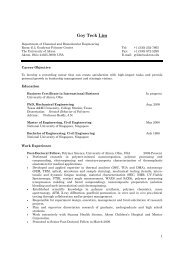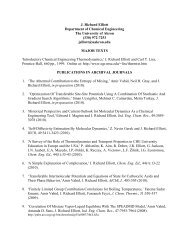Sociology of the Anarchists - Gozips.uakron.edu - The University of ...
Sociology of the Anarchists - Gozips.uakron.edu - The University of ...
Sociology of the Anarchists - Gozips.uakron.edu - The University of ...
Create successful ePaper yourself
Turn your PDF publications into a flip-book with our unique Google optimized e-Paper software.
<strong>The</strong> methods elaborated by McKeachie, such as “learning cells” and team learning, also<br />
bolster my conviction that <strong>the</strong>re should not be blatant learning hierarchies. I think it IS<br />
true that we can learn just as much from each o<strong>the</strong>r as we can from an instructor. This<br />
makes sense in a ma<strong>the</strong>matical/probability sense (more people exchange ideas, discussing<br />
and sharing thoughts), but also in terms <strong>of</strong> equity. I think most people who have been at<br />
universities for long enough to enter graduate school can learn <strong>the</strong> subject matter in most<br />
texts if we are interested in it, and <strong>the</strong>n teach it to o<strong>the</strong>rs (thus reinforcing that<br />
knowledge). <strong>The</strong>re's no reason to assume that students are not just as capable <strong>of</strong> doing<br />
that for o<strong>the</strong>rs as we are. “Learning cells” as McKeachie describes would seem to be a<br />
good partnering tool when done by pre-class question writing and random formations (it<br />
would help students learn to ask and answer questions <strong>of</strong> what interests <strong>the</strong>m, and to meet<br />
and engage with o<strong>the</strong>rs <strong>the</strong>y normally wouldn't, and thus to learn and teach from varying<br />
viewpoints/styles).<br />
I think that class size if very important. We all know that <strong>the</strong>re can be more discussion in<br />
smaller classes (not to mention individual instructor attention), but that doesn't mean that<br />
large classes will be incompatible with this type <strong>of</strong> learning. I've seen a sociology<br />
pr<strong>of</strong>essor (John Zipp) use small groups in a very positive way that I think helps a great<br />
deal. That said it's important to note that <strong>the</strong> primary issue is <strong>the</strong> size <strong>of</strong> <strong>the</strong> learning unit<br />
itself—in large classes, <strong>the</strong> size <strong>of</strong> groups must not be larger than those within smaller<br />
classes. (In many ways, it reminds me <strong>of</strong> “affinity groups”—ano<strong>the</strong>r activist configuration<br />
—how <strong>the</strong>re is an ideal size that should not be superceded, or else <strong>the</strong> ability <strong>of</strong> <strong>the</strong> group<br />
to function will be rendered useless).<br />
I appreciate that “active learning” and group work is not <strong>of</strong>fered as a panacea to all o<strong>the</strong>r<br />
types <strong>of</strong> learning and instruction, but also how it is not a way to avoid for class<br />
preparation. Much deliberation and thought needs to go in how to use <strong>the</strong>se varying group<br />
structures to make <strong>the</strong>m useful, o<strong>the</strong>rwise <strong>the</strong>y could be a total waste <strong>of</strong> time. Also,<br />
combining smaller groups with large groups (like “clusters”, which are what anarchists<br />
call collections <strong>of</strong> affinity groups) or a whole class, will require our adept facilitation <strong>of</strong><br />
<strong>the</strong> discussion (and <strong>of</strong> course a mastery <strong>of</strong> <strong>the</strong> material in order to help focus discussion<br />
on what appears to be important to <strong>the</strong> class). It's sometimes claimed that group learning<br />
requires student participation and interest in order for it to work. On <strong>the</strong> o<strong>the</strong>r hand,<br />
individual learning (being lectured to) also requires active student participation and<br />
interest, yet it is far more difficult to convince students to dedicate <strong>the</strong>mselves to learning<br />
in such a passive environment and mode <strong>of</strong> learning.<br />
Dealing with controversial topics and despair:<br />
Moore's (1997) piece echoed what I and o<strong>the</strong>rs have already noted in our own experiences<br />
in classes. Personally, it annoys <strong>the</strong> shit outta me when I get more “respect” for equally<br />
“radical” ideas than female colleagues or colleagues <strong>of</strong> color, just b/c I'm a white man. I<br />
loved <strong>the</strong> experiment she did with her classes and how it was able to provoke a discussion<br />
about her student's preconceptions <strong>of</strong> what she was teaching and why <strong>the</strong>y might be<br />
considering it less valid due to <strong>the</strong> source. (Just to toss out <strong>the</strong> <strong>of</strong>fer: I'd be happy to do<br />
<strong>the</strong> same for my female colleagues who will be teaching in <strong>the</strong> near future, particularly<br />
[ Williams 99 ] [ this is a draft. do not cite. ]






